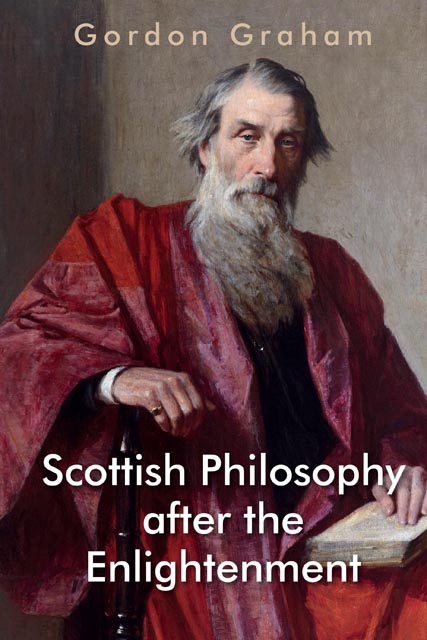Book contents
- Frontmatter
- Contents
- Preface and Acknowledgements
- Series Editor’s Introduction
- A Note on Women in Scottish Philosophy: Mrs Oliphant
- A Chronology of Scottish Philosophy after the Enlightenment
- 1 An Autobiographical Prologue
- 2 Sir William Hamilton and the Revitalisation of Scottish Philosophy
- 3 James Frederick Ferrier and the Course of Scottish Philosophy
- 4 Psychology and Moral Philosophy: Alexander Bain
- 5 Thomas Carlyle and the Philosophy of Rhetoric
- 6 Hegelianism and its Critics
- 7 Scottish Philosophy’s Progress
- 8 Religion, Evolution and Scottish Philosophy
- 9 The Gifford Lectures and the Re-affirmation of Theism: Alexander Campbell Fraser
- 10 The Culmination of Scottish Philosophy: A. S. Pringle-Pattison
- 11 John Macmurray and the Self as Agent
- Bibliography
- Index
6 - Hegelianism and its Critics
Published online by Cambridge University Press: 07 June 2023
- Frontmatter
- Contents
- Preface and Acknowledgements
- Series Editor’s Introduction
- A Note on Women in Scottish Philosophy: Mrs Oliphant
- A Chronology of Scottish Philosophy after the Enlightenment
- 1 An Autobiographical Prologue
- 2 Sir William Hamilton and the Revitalisation of Scottish Philosophy
- 3 James Frederick Ferrier and the Course of Scottish Philosophy
- 4 Psychology and Moral Philosophy: Alexander Bain
- 5 Thomas Carlyle and the Philosophy of Rhetoric
- 6 Hegelianism and its Critics
- 7 Scottish Philosophy’s Progress
- 8 Religion, Evolution and Scottish Philosophy
- 9 The Gifford Lectures and the Re-affirmation of Theism: Alexander Campbell Fraser
- 10 The Culmination of Scottish Philosophy: A. S. Pringle-Pattison
- 11 John Macmurray and the Self as Agent
- Bibliography
- Index
Summary
I
‘Hegelianism and its Critics’ was the title of an article by Andrew Seth, published in the journal Mind in 1894. Seth was writing in response to a two-part article in Mind by Henry Jones, published the previous year, which was itself a response to previous articles by Seth in the Philosophical Review. Seth’s article was preceded by a short piece by R. B. Haldane, and followed by a comment from David G. Ritchie, both of which also appeared in Mind under similar titles. These vigorous and extended exchanges can be regarded as the focal point for an argument about the place and role of Hegelianism, and Idealism more broadly, in the trajectory of nineteenth-century Scottish philosophy. This chapter will trace the genesis of the argument, identify its key points, and seek to assess its wider philosophical significance.
Kant knew about philosophy in Scotland well in advance of Scottish philosophers knowing much about him. Yet even before Kant’s death, selections from his works had been translated into English by a Scot, John Richardson. Since Richardson was very familiar with Hume, he may have been a Scottish graduate, but his continuing Scottish connections were tenuous. He spent most of his life in Germany, his translations and ‘recensions’ of Kant were published in London, and his efforts seem to have had little or no impact in Scotland (or anywhere, for that matter). It was not until the mid-nineteenth century that accurate English translations of some of Kant’s works were widely available, two of the most enduring being by Scottish graduates. J. W. Semple’s translation of Kant’s Metaphysic of Ethics, with commentary, first appeared in the 1830s, but attracted a much larger readership when it was reprinted in 1867. This was on the initiative of Henry Calderwood, recently appointed to the Chair of Moral Philosophy at Edinburgh, who wanted his students to learn about Kant’s moral philosophy. J. M. D. Meiklejohn’s translation of Kant’s Critique of Pure Reason was published in 1856. For a long time, it served as the standard text and was the version included in the Everyman’s Library. Eventually Meiklejohn was displaced by the work of another Scottish philosopher, Norman Kemp Smith, whose translation is still regarded as authoritative.
- Type
- Chapter
- Information
- Scottish Philosophy after the Enlightenment , pp. 113 - 127Publisher: Edinburgh University PressPrint publication year: 2022



